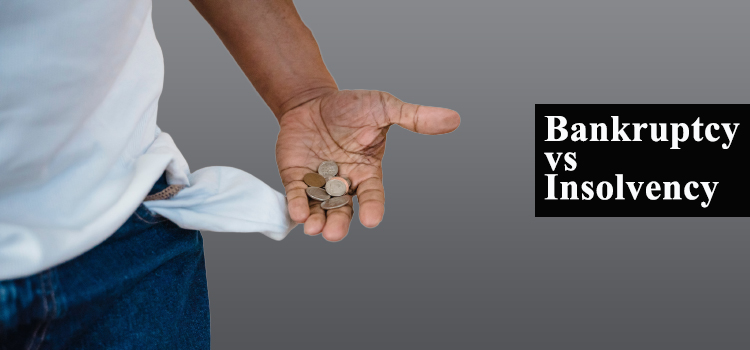Bankruptcy vs Insolvency: Are they Synonyms?
Posted On : December 27, 2022

Table of Contents
For commerce or law students, the terms bankruptcy law vs. insolvency law are quite intimidating. The difference between insolvency and liquidation is still understandable. But what is insolvency in the first place? Explore bankruptcy vs insolvency in the blog below with the help of tabular differentiation.
Indian culture promotes today’s savings for the ‘rainy day’. On the contrary, the West promotes the ideology of ‘Enjoy today, for tomorrow may never come’. With more Western waves on Indians, and not ignoring the uncertain times, the ideology and traditions are transforming. With savings in hand, downfall may not approach sooner. But when you are not at all economically prepared, keep on spending your income, and continue taking loans, it’s like running with eyes tightly closed. You are just one rock stone away from the drastic fall.
Before incurring any loans, it is always better to plan for ways of repayment. What happens if the loan is not paid? Bankruptcy vs insolvency are terms interchangeably used in such cases when liabilities exceed the assets. But are they the same? If you are insolvent, do you eventually become bankrupt? The answers have been addressed hereunder in detail.
What is Insolvency?
When a person is unable to pay back the creditors since the liabilities (loans) have exceeded the assets, such a state is known as insolvency. The term ‘person’ here includes the following:
- An individual
- A company
- A partnership
- A Hindu Undivided Family
- A trust
- A limited liability partnership
- Any other entity established under a statute
- The term also includes a person residing outside India
The insolvency petition procedure in India is provided under the Insolvency and Bankruptcy Code, 2016.
What do you mean by Bankruptcy?
When a person (as per the definition above), is unable to repay the financial obligations due to insolvency, i.e. lack of sufficient assets, bankruptcy proceedings are initiated. The application may be filed by the debtor, or even by creditors. It is the court's recognition of the person’s inability to pay off the assets and the need for authorities to interfere. Bankruptcy may be followed by reorganisation of assets for the sake of repayment, or liquidation of assets to pay off the creditors.
Bankruptcy vs Insolvency
When a person is facing insolvency, it's time to take corrective action to avoid the possibility of bankruptcy. Such corrective action could be reducing and regulating the expenses, or seeking some more time to repay the loan amount. Inability leads to more pressure from the creditors regarding recovery and also results in the problem of NPA. In such a case, the debtors or even the creditors may seek the court’s interference to order bankruptcy so that debts are set off through assets.
There is another term commonly used while discussing insolvency and bankruptcy, i.e. default and liquidation. When there is a due date on which a person is supposed to pay back the debt in whole or in instalments and the same is not paid, it is an event of default. Liquidation comes later when the person is not able to pay back the liabilities and has to sell his/ her assets to pay back the creditors, this is liquidation. A banking lawyer may bring some clarity in case of confusion among the alternate terms.
Bankruptcy and Insolvency - Similarities that Confuse
- Both insolvency as well as bankruptcy are the results of non-payment of debts.
- In both cases, the liabilities have exceeded the current assets of the concerned person/ organisation.
- Bankruptcy is preceded by insolvency.
- Both the terms are misunderstood and often used as synonyms.
Bankruptcy Law vs. Insolvency Law
The Insolvency and Bankruptcy Code, 2016 provides legal provisions for both bankruptcy as well as insolvency. As discussed above, insolvency is a financial state, while bankruptcy is a court order. Thus, the events that take place and the possibilities that follow are different for bankruptcy vs insolvency as explained in the table below.
Difference Between Bankruptcy and Insolvency
|
Particulars |
Insolvency |
Bankruptcy |
|
Meaning |
Insolvency is the state of a person (as explained above) who is unable to pay the liabilities. |
Bankruptcy is the legal action for a person unable to pay off the debts seeking help from the authorities. |
|
Beginning |
When the amount of debts goes above the assets owned, it is a state of insolvency. |
When there is no going back from the state of insolvency, the doors of courts are knocked. Filing the petition by debtors or creditors initiates bankruptcy proceedings. |
|
Use of term |
‘Insolvency’ is used for an individual or organisation unable to pay back the debts incurred. Insolvency of a company may lead to liquidation. |
Insolvency leads to the inability of an individual to repay his/ her liabilities thereby seeking court interference leads to a bankruptcy petition. |
|
Effect |
Insolvency is a preliminary state which can be corrected through several measures. |
Bankruptcy is a declaration of the court which is resolved against the assets owned by the insolvent person. It helps debtors seek legal remedies against harassment by recovery agents. |
|
Solution |
Reducing and regulating the expenses, or seeking some more time to repay the loan amount are the options available to an insolvent person. |
The only options left for a bankrupt person are to seek some more time to reorganise the assets or sell off the assets through liquidation to pay off the creditor's amount. |
|
What follows |
When a person is unable to pay back, the same is followed by default on the date of paying off the liabilities. When the court’s interference is sought, it initiates the bankruptcy process. |
Bankruptcy is the court’s declaration of a person’s inability to pay back the debts. It may be followed by reorganisation or liquidation of the assets. Credtor’s recovery gives the debtor a fresh start with a clean slate. |
By now, one should be able to extract the pointers of the difference between insolvency and bankruptcy. It is clear that the two terms can not be used interchangeably. Insolvency is the prequel to bankruptcy, default, and even liquidation.
Bankruptcy vs Insolvency - Frequently Asked Questions
Q- What is meant by insolvency?
A- Insolvency is the state of financial distress when a person’s liabilities are more than the assets owned. This leads to more debts than the means to pay back those debts, resulting in pressure from the creditors.
Q- Are bankruptcy and insolvency the same?
A- No, people often use bankruptcy vs insolvency interchangeably. However, insolvency is a state whereby a person is unable to pay the liabilities, while he/ she still holds the chance. However, once an insolvent person is declared bankrupt by the court, there is no looking back. Debts are mostly set off through the person’s assets.
Q- What comes first insolvency or bankruptcy?
A- Insolvency is a financial state followed by bankruptcy which is a court order. The first phenomenon still gives the debtor a chance to resolve the situation by cutting costs, re-negotiation or seeking some more time. But the bankruptcy proceedings do not give any such chance to the debtor and recovery for creditors is the major agenda with the help of authorities.
Q- What is the insolvency and bankruptcy process?
A- Insolvency is a process of the inability of a person to pay back the debts incurred. However, bankruptcy is the legal process when a person loses control to repay the liabilities and mostly, the authorities are in charge of liquidating his/ her/ its assets and repaying creditors.
Q- What are the two types of insolvency?
A- It is mostly categorised among cash-flow and balance sheet insolvency. Cash-flow insolvency, as the name suggests, is the lack of liquid assets resulting in the inability to repay the debts. On the other hand, the balance sheet insolvency condition is the absence of enough assets to fulfil debt obligations.
Q- What is bankruptcy and insolvency?
A- Insolvency is a circumstance, while bankruptcy is a legal status. If an organisation is insolvent, it means it is unable to pay its debts. If a business or person is declared bankrupt, the debts must be paid off by reorganising the payment process with government assistance or by selling assets.
Q- What is an example of insolvency and bankruptcy?
A- When a distressed company is unable to repay its creditors on schedule, it may become insolvent. Whereas a company will be called bankrupt once it has become insolvent and has to sell it’s assets to clear the debts.
























